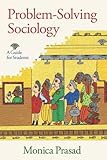Problem-Solving Sociology : A Guide for Students / by Monica Prasad
Publication details: New York Oxford University Press 2021Description: vi, 234 pages 20 cmISBN:- 9780197558492 (Paperback)
- 301
| Item type | Current library | Shelving location | Call number | Materials specified | Status | Notes | Barcode | |
|---|---|---|---|---|---|---|---|---|
 BOOKs
BOOKs
|
National Law School | New Arrival - Display Area | 301 PRA (Browse shelf(Opens below)) | PB | Not For Loan | Recommended by Dr. Anindita Adhikari | 40497 |
Browsing National Law School shelves,Shelving location: New Arrival - Display Area Close shelf browser (Hides shelf browser)
1. The Thought Machine -
2. But is it Objective? -
3. Victims and Villains -
4. A Magic Trick: Research Design for Problem-Solving -
5. The View from Mars -
6. Decision Points and Exercises (1): Finding Your Project -
7. Decision Points and Exercises (2): Troubling Your Assumptions -
8. Decision Points and Exercises (3): Clarifying and Defending Your Argument -
9. The Place of Problem Solving in American Sociology -
10. An Orrery of Objections -
11. When to Stop Problem Solving -
12. Building Your Own Boat -
Acknowledgments -
Endnotes -
Index.
Most students arrive in graduate sociology programs eager to engage with the pressing social and political issues of the day. Yet that initial enthusiasm does not always survive the professional socialization of graduate school. In Problem-Solving Sociology, Monica Prasad shows graduate students and early career sociologists how to conduct research that uses sociological theory to help solve real-world problems, and how to use problem-solving to improve sociological theory. Prasad discusses how to be objective when examining issues of injustice and oppression, and provides methodological strategies and plenty of exercises for research aimed at creating change. She gives examples throughout of problem-solving research conducted at all levels, from undergraduate theses to the major figures of the discipline. She also considers how to respond to some common objections; where problem-solving fits into the landscape of sociological practice; and how to build a life in problem-solving.
There are no comments on this title.







